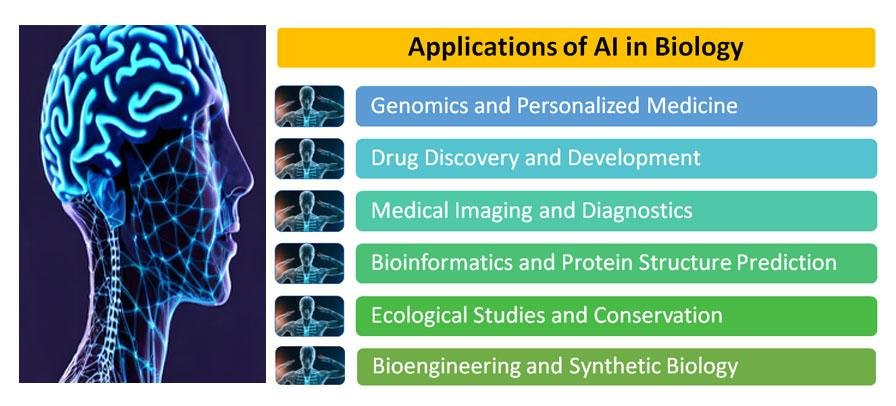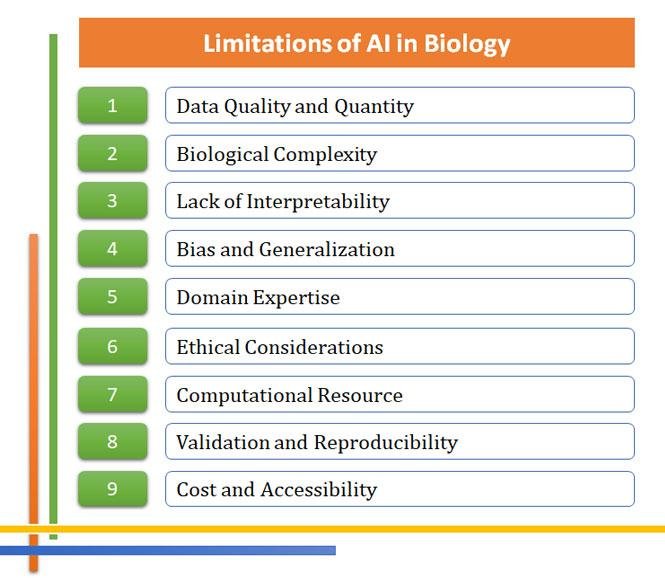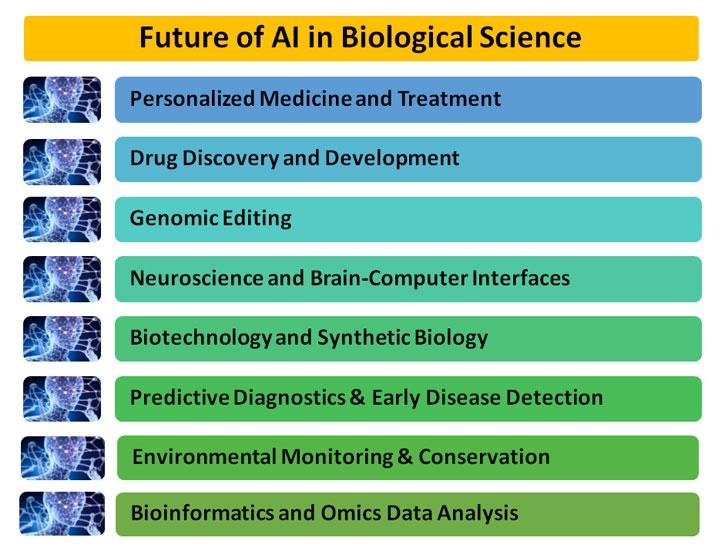Artificial Intelligence (AI) refers to the development of computer systems that can perform tasks that typically require human intelligence. It involves creating algorithms and models that enable machines to learn from data, adapt to new information, and make decisions. With the ability to process vast amounts of data, recognize patterns, and make intelligent decisions, AI has become an indispensable tool in advancing our understanding of biological processes. This article summarizes the Applications of Artificial Intelligence in biology. We also look into the limitations and future pespectives of AI in biological science.
AI in Biological Science
Ø AI has revolutionized all fields including different disciples of biological sciences.
Ø In biological science, three important potentials of AI tools are utilized, namely:
$. Ability to process vast amounts of data
$. Recognize patterns
$. Make intelligent decisions
Learn more: Macine Learning in Bioinformatics
Applications of Artificial Intelligence in Biology

(1). Genomics and Personalized Medicine
Ø AI has transformed genomics by enabling the analysis of massive databases, unravelling genetic complexities, and assisting in the identification of disease-related genes.
Ø AI can analyse an individual’s genetic makeup to predict disease susceptibility, treatment responses, and potential side effects (personalized medicine).
Ø This approach helps clinicians to design treatments for better patient outcomes and minimizing side effects.
Learn more: Top 10 Bioinformatics Databases
(2). Drug Discovery and Development
Ø Drug discovery process has been significantly accelerated by AI.
Ø AI algorithms can predict molecular interactions, identify potential drug candidates and simulate their effects on biological systems.
| Bioinformatics Notes | Bioinformatics PPT | Bioinformatics MCQs |
Ø AI-powered virtual screening reduces the time and costs associated with identifying potential drug compounds.
Ø This increases the success rate of discovering novel therapeutic agents for various diseases, including cancer and infectious diseases.
(3). Medical Imaging and Diagnostics
Ø AI’s image recognition capabilities have revolutionized medical diagnostics.
Ø Machine learning algorithms can detect patterns in medical images, aiding in the early diagnosis of diseases like cancer.
Ø AI tools are extensively utilized in the diagnosis of neurodegenerative and cardiovascular disorders.
Ø AI-enhanced radiology systems improve accuracy, speed, and consistency of medical image interpretation
Ø All these ultimately leads to better patient care and treatment outcome.
| You may also like NOTES in... | ||
|---|---|---|
| BOTANY | BIOCHEMISTRY | MOL. BIOLOGY |
| ZOOLOGY | MICROBIOLOGY | BIOSTATISTICS |
| ECOLOGY | IMMUNOLOGY | BIOTECHNOLOGY |
| GENETICS | EMBRYOLOGY | PHYSIOLOGY |
| EVOLUTION | BIOPHYSICS | BIOINFORMATICS |
(4). Bioinformatics and Protein Structure Prediction
Ø AI also plays a crucial role in bioinformatics and computational biology.
Ø AI algorithms can analyse biological data to understand complex molecular interactions.
Ø In protein structure prediction, AI models use vast protein sequence databases to predict three-dimensional structures.
Ø This also enable researchers to design drugs that target specific protein shapes implicated in diseases.
Learn more: Top 10 Tools in Bioinformatics Data Analysis
(5). Ecological Studies and Conservation
Ø AI contributes to ecological research by analysing complex ecological data.
Ø It can help to predict biodiversity changes, habitat loss, and species distributions.
Ø AI-powered monitoring systems can track animal behaviour, migration patterns, and population dynamics.
Ø All these helps in decision making for conservation and protecting vulnerable species and ecosystems.
(6). Bioengineering and Synthetic Biology
Ø AI-driven approaches have paved the way for bioengineering and synthetic biology.
Ø By simulating complex biological systems, AI aids in designing engineered microbes for sustainable production of biofuels, chemicals, and pharmaceuticals.
Ø Synthetic biology benefits from AI-guided design and optimization of genetic circuits, enabling the creation of organisms with tailored functions.
Limitations of AI in Biological Sciences
AI has shown remarkable potential in biological science, but it also has limitations that researchers need to be aware. Data privacy, bias in AI models, and interpretability of results are critical concerns. Some of the main limitations of AI tools in biological science is listed below:

(1). Data Quality and Quantity
Ø AI algorithms require vast and high-quality datasets for training.
Ø This can be challenging to obtain in biological science due to data variability, noise, and limited sample sizes.
(2). Biological Complexity
Ø Biological systems are intricate and interconnected.
Ø It often involving nonlinear relationships and dynamic interactions that can be difficult for AI algorithms to model accurately.
(3). Lack of Interpretability
Ø Some AI models, like deep neural networks, is hard to interpret how they arrive at their conclusions, which is critical for biological insights.
(4). Bias and Generalization
Ø AI models trained on biased data can perpetuate existing biases.
Ø This can lead to inaccurate results and discriminatory outcomes.
Ø Biased outcomes are extremely dangerous in medical applications.
(5). Domain Expertise
Ø Developing AI solutions in biological science requires collaboration between AI experts and domain experts.
Ø Lack of proper biological understanding can lead to inaccurate interpretations.
(6). Ethical Considerations
Ø AI usage raises ethical concerns, especially in areas like genome editing.
Ø The consequences of AI-driven decisions could have far-reaching implications.
(7). Computational Resource
Ø Training complex AI models requires significant computational resources
Ø This might be limiting for smaller research labs or resource-constrained settings.
(8). Validation and Reproducibility
Ø AI-generated results may be hard to replicate, leading to challenges in validation and reproducibility, which are crucial in scientific research.
(9). Cost and Accessibility
Ø Implementing AI technologies can be expensive
Ø High coast limits the accessibility of AI tools and widespread adoption, particularly in resource-limited environments.
Future Perspectives of AI in Biological Research
The future perspectives of artificial intelligence (AI) in biological science are vast and promising, with potential advancements across various domains. Here are some key future perspectives:

(1). Personalized Medicine and Treatment
Ø AI will play a pivotal role in tailoring medical treatments to individual genetic profiles, predicting disease susceptibilities, and recommending personalized therapies. This will lead to more effective treatments with fewer side effects.
(2). Drug Discovery and Development
Ø AI will accelerate drug discovery by simulating the interactions between compounds and biological systems, leading to the identification of novel drug candidates in a fraction of the time.
(3). Genomic Editing
Ø AI will continue to advance our understanding of the human genome, enabling precise genome editing for treating genetic diseases.
Ø CRISPR-Cas9 technology, guided by AI algorithms, could revolutionize gene therapies.
(4). Neuroscience and Brain-Computer Interfaces
Ø AI will aid in decoding complex brain functions, leading to advancements brain-computer interfaces
Ø This can help to restore mobility and communication to individuals with disabilities.
(5). Biotechnology and Synthetic Biology
Ø AI-driven design will create synthetic organisms with custom-made functionalities for various applications, such as biofuel production, pollution remediation, and biodegradable materials.
(6). Predictive Diagnostics and Early Disease Detection
Ø AI will enable early diagnosis of diseases using diverse data sources, including molecular markers, medical images, and patient records.
Ø This can improve treatment outcomes and reduce healthcare costs.
(7). Environmental Monitoring and Conservation
Ø AI-powered sensors and drones will aid in monitoring ecosystems, tracking biodiversity changes, and predicting environmental events, enhancing conservation efforts and sustainable resource management.
(8). Bioinformatics and Omics Data Analysis:
Ø AI will refine the analysis of complex biological datasets, leading to discoveries in proteomics, transcriptomics, and metabolomics.
Learn more: Top 10 Bioinformatics Databases
Summary: The future of AI in biological science holds great potential for transformative breakthroughs that will reshape medicine, agriculture, conservation, and our understanding of life itself. However, the integration of AI will require collaboration among researchers, ethicists, policymakers, and stakeholders to navigate challenges and ensure responsible and beneficial outcomes.
<<< Back to BIOINFORMATICS Notes
| You may also like... | ||
|---|---|---|
| NOTES | QUESTION BANK | COMPETITIVE EXAMS. |
| PPTs | UNIVERSITY EXAMS | DIFFERENCE BETWEEN.. |
| MCQs | PLUS ONE BIOLOGY | NEWS & JOBS |
| MOCK TESTS | PLUS TWO BIOLOGY | PRACTICAL |

which language is better to learn it to do work in bioinformatics p